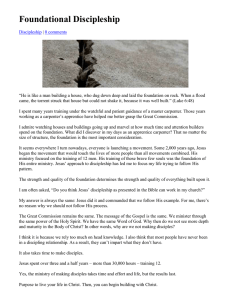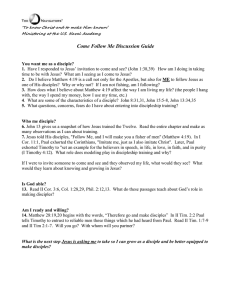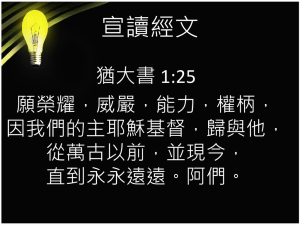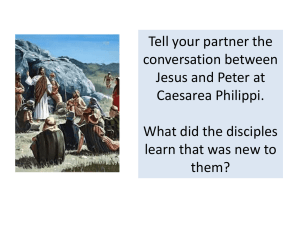Making Disciples Jesus Way: A Few at a Time
advertisement
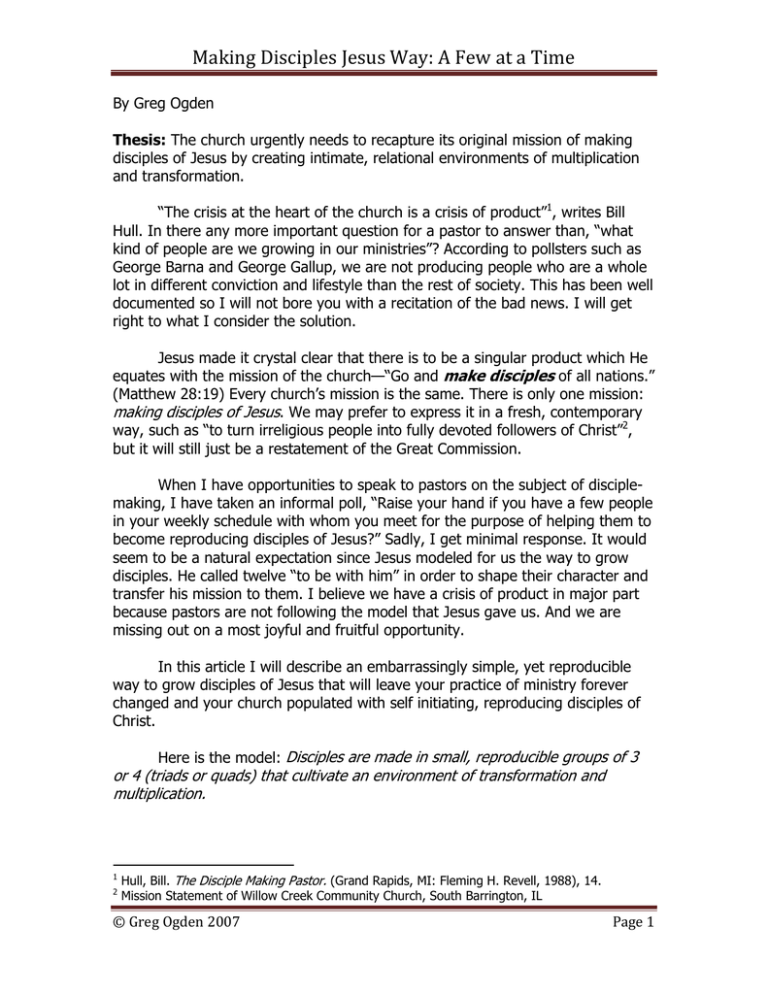
Making Disciples Jesus Way: A Few at a Time By Greg Ogden Thesis: The church urgently needs to recapture its original mission of making disciples of Jesus by creating intimate, relational environments of multiplication and transformation. “The crisis at the heart of the church is a crisis of product”1, writes Bill Hull. In there any more important question for a pastor to answer than, “what kind of people are we growing in our ministries”? According to pollsters such as George Barna and George Gallup, we are not producing people who are a whole lot in different conviction and lifestyle than the rest of society. This has been well documented so I will not bore you with a recitation of the bad news. I will get right to what I consider the solution. Jesus made it crystal clear that there is to be a singular product which He equates with the mission of the church—“Go and make disciples of all nations.” (Matthew 28:19) Every church’s mission is the same. There is only one mission: making disciples of Jesus. We may prefer to express it in a fresh, contemporary way, such as “to turn irreligious people into fully devoted followers of Christ”2, but it will still just be a restatement of the Great Commission. When I have opportunities to speak to pastors on the subject of disciplemaking, I have taken an informal poll, “Raise your hand if you have a few people in your weekly schedule with whom you meet for the purpose of helping them to become reproducing disciples of Jesus?” Sadly, I get minimal response. It would seem to be a natural expectation since Jesus modeled for us the way to grow disciples. He called twelve “to be with him” in order to shape their character and transfer his mission to them. I believe we have a crisis of product in major part because pastors are not following the model that Jesus gave us. And we are missing out on a most joyful and fruitful opportunity. In this article I will describe an embarrassingly simple, yet reproducible way to grow disciples of Jesus that will leave your practice of ministry forever changed and your church populated with self initiating, reproducing disciples of Christ. Here is the model: Disciples are made in small, reproducible groups of 3 or 4 (triads or quads) that cultivate an environment of transformation and multiplication. 1 2 Hull, Bill. The Disciple Making Pastor. (Grand Rapids, MI: Fleming H. Revell, 1988), 14. Mission Statement of Willow Creek Community Church, South Barrington, IL © Greg Ogden 2007 Page 1 Making Disciples Jesus Way: A Few at a Time In my experience, the following three elements form the necessary building blocks to grow disciples, which, in turn, addresses our “crisis of product”: • • • The model for multiplication The priority of relationships The environment for accelerated growth The Model for Multiplication I call it my major “ah-ha” moment in ministry. It has shaped my approach to growing disciples more than anything else. Frankly, it was a discovery breakthrough I stumbled on. I had been frustrated that I was not seeing a multiplication of disciples. The one-on-one model was the paradigm that I had assumed was the way to make reproducing disciples. After all, wasn’t the Paul-Timothy relationship the biblical pattern? Discipling meant to give myself to one other person for the purpose of seeing the life of Christ built in them, which would then lead them to do the same for another and so on. The only trouble was, I wasn’t seeing “them doing the same for another.” In other words, there was no multiplication. What was I doing wrong? We have all heard that the definition of insanity is doing the same thing over and over again, while expecting different results. Frustrated, I would redouble my efforts: make sure I had good content; ratchet up my prayer life; teach the skills of bible study, witness, etc; and yet I was not able to instill confidence, pass on the vision, nor empower the other person to disciple others. All my refinements only led to the same results. Then the break-through came. I had written a disciple-making curriculum3, which became the basis for my final project for a Doctor of Ministry degree. My faculty mentor thought it would be a worthy experiment to test the dynamics of this material in a variety of settings. So in addition to the one-onone, I invited two others to join me on this journey. There was no way I could have anticipated the potency to be unleashed. Just by adding a third person it was as if the Holy Spirit was present to us in a way that was life-giving and transforming and laid the foundation for multiplication. I have never gone back to the one-on-one model for making disciples because of what I experienced. Now twenty years later, I have had considerable 3 Ogden, Greg. Discipleship Essentials: A Guide to Building Your Life in Christ. (Downers Grove, IL: InterVarsity Press, 1998.) © Greg Ogden 2007 Page 2 Making Disciples Jesus Way: A Few at a Time opportunity to reflect on the difference in dynamics between triad and quads, and the one-on-one approach. What were the limitations of the one-on-one model? 1. In the one-on-one the discipler carries the full weight of responsibility for the spiritual welfare of another. The discipler is like the mother bird that goes out to scavenge for worms to feed to her babies. With their mouths wide open, the babes wait in their nest for the mother bird to return. The discipler is cast in the role of passing on their vast knowledge to the one with limited knowledge. 2. The one-on-one relationship sets up a hierarchy that tends to result in dependency. The one-on-one creates a father-son, teacher-student, matureimmature relationship. As appreciative as the Timothy might be, the one in the receiving position will more often than not, not be able to see themselves in the giving position. The gulf between the Paul and the Timothy is only accentuated when the relationship is between pastor and parishioner. The pastor is the trained professional, who has superior biblical knowledge which the nonprofessional, ordinary lay person will never see themselves achieving. 3. The one-on-one limits the interchange or dialogue. I liken the one-on-one discourse to a ping-pong match. It is back and forth, with the discipler under continuous pressure to advance the ball. The discipler must continue to press the interchange on to a higher plane. 4. The one-on-one also creates a one-model approach. The primary influence on a new disciple becomes a single person. The parameters of the discipling experience are defined by the strengths and weaknesses of one individual. 5. Finally, the one-on-one model does not generally reproduce. If it does, it is rare. Only self confident, inwardly motivated persons can break the dependency and become self-initiating and reproducing.4 In my opinion we have inadvertently held up a hierarchical, positional model of discipling that is non-transferable. As long as there is the sense that one person is over another by virtue of superior spiritual authority, however that is measured, very few people are going to see themselves as qualified to disciple others. We may tout this is as a multiplication method, but in actuality it contains the seeds of its own destruction. As a result of my experience, I commend a non-hierarchical model that views discipling as a mutual process of peer mentoring5. In order to avoid the 4 These generalities are in no way meant to demean the positive and powerful experiences that a one-on-one relationship has meant to many. When it comes to the multiplication of disciples my experience teaches me that this generally does not lead to reproduction. © Greg Ogden 2007 Page 3 Making Disciples Jesus Way: A Few at a Time dependency trap, the relationship needs to be seen as side-by-side, rather than one having authority or position over another. An Alternative Practical Model of Disciple-Making (Triads/Quads) Here is my best take on why triads/quads are energizing, joy-filled and reproductive: 1. There is a shift from unnatural pressure to the natural participation of the discipler. When a third or fourth person is added, the discipler is no longer the focal point, but they are a part of a group process. The discipler in this setting is a fellow participant. Though the discipler is the convener of the triad/quad, they quickly become one of the group on the journey together toward maturity in Christ. 2. There is a shift from hierarchy to peer relationship. The triad/quad naturally creates more of a come-alongside mutual journey. The focus is not so much upon the discipler as it is upon Christ as the one toward whom all are pointing their lives. Even as a pastor, I found that though the relationship may have started with a consciousness that I was the “Bible answer-man” because of my title and training, within the first few weeks the triad/quad allows me to be another disciple with fellow disciples who are attempting together to follow Jesus. 3. There is a shift from dialogue to dynamic interchange. In my initial experiment with triads, I often came away from those times saying to myself, “What made that interchange so alive and dynamic?” The presence of the Holy Spirit seemed palpable. Life and energy marked the exchange. As I have come to understand group dynamics, one-on-one is not a group. It is only as you add a third that you have the first makings of a group (Think trinity) 4. There is shift from limited input to wisdom in numbers. The book of Proverbs speaks of the wisdom that comes from many counselors (Proverbs 15:22). It is often those who may be perceived as younger or less mature in the faith from which great wisdom comes, or a fresh spark of life or just great questions. In a current quad, one of the men at our initial gathering announced, “I have never opened the Bible.” I had observed an eagerness and hunger in Mick, so I was sure that I had misunderstood his comment. So I responded, “You mean you have never studied the Bible seriously”. “No, I have never opened a Bible.” Since that first session, Mick has demonstrated a veracious appetite for 5 “Discipling is an intentional relationship in which we walk alongside other disciples in order to encourage, equp and challenge one another in love to grow toward maturity in Christ. This includes equipping the disciple to teach others as well” (Ogden, Discipleship Essentials, 17). © Greg Ogden 2007 Page 4 Making Disciples Jesus Way: A Few at a Time Scripture. Yet what has been particularly challenging is his perceptive questions that have led to engaging dialogue and deeper exploration. 5. There is a shift from addition to multiplication. For me there is no greater joy than to see a Christian reproduce. All the above adds up to empowerment. For over two decades, I have observed an approximate 75% reproduction rate through the triad/quad model of disciple-making. In summary, a smaller unit encourages multiplication because it minimizes the hierarchical dimensions and maximizes a peer-mentoring model. By providing a discipleship curriculum specifically designed for this intimate relationship, it creates a simple, reproducible structure, which almost any growing believer can lead. Leadership in these groups can be rotated early on since the size makes for an informal interchange and the curriculum provides a guide to follow. Anything worthy of the name of discipling must have a way of creating the dynamic of intergenerational multiplication. But this is only one aspect of growing self-intiating, reproducing disciples. Disciples Are Made In Relationships, Not Programs Making disciples places priority on an invitation to relationships, not an invitation to a program. Disciple-making is not a six-week nor a ten-week, nor even a thirty week program. We have tended to bank our efforts on making disciples through programs, while not keeping a priority on the relational process. Biblically, though, disciples are made in relationships. When I am forming a new triad/quad, I approach someone personally, eyeball to eyeball in the following way: First, I ask the Lord to put on my heart those to whom He is drawing me. I am looking for those who are hungry and teachable. When there is a settled conviction as to who the Lord would have me approach, here is generally what I say to them, “Will you join me, walk with me as we grow together to become better disciples of Christ? I would like to invite you to meet with me and one or two others weekly for the purpose of becoming all that the Lord intends us to be. As I was praying about this relationship, I sensed the Lord drawing me to you.” How does this relational approach differ from a program? (1) Discipling relationships are marked by intimacy, whereas programs tend to be focused on information. © Greg Ogden 2007 Page 5 Making Disciples Jesus Way: A Few at a Time Programs operate with the assumption that if someone has more information that it will automatically lead to transformation. In other words, right doctrine will produce right living. Filling people's heads with Scripture verses and biblical principles will lead to change in character, values and a heart for God. Alicia Britt Cole captures this difference between program and relationship, “Program was safer, more controllable, and reproducible—less risky, less messy, less intrusive. It seemed easier to give someone an outline than an hour, a well-worn book than a window into our humanity. How easy it is to substitute informing people for investing in people, to confuse organizing people with actually discipling people. Life is not the offspring of program or paper. Life is the offspring of life. Jesus prioritized shoulder-to-shoulder mentoring because His prize was much larger than information; it was integration.”6 (2) Discipling relationships involve full, mutual responsibility of the participants, whereas programs have one or a few who do on behalf of the many. Most programs are built around an individual or a few core people who do the hard work of preparation and the rest come as passive recipients of their work. Of course, this is less true of a more egalitarian small group than it is of a class where one-way communication dominates. Though this may provide tremendous benefit to one who has done the preparation, the result is usually enormous amounts of unprocessed information. As much as I believe in the power of preaching for conviction and decision, I would be naïve to believe that preaching alone produces disciples. If preaching could produce disciples, the job would have been done. In a discipling relationship the partners share equal responsibility for preparation, self-disclosure, and an agenda of life-change. This is not about one person being the insightful teacher, whereas the others are the learners who are taking in the insights of one whose wisdom far exceeds the others. Certainly maturity levels in Christ will vary, but the basic assumption is that in the give and take of relationships, the one who is the teacher and the one who is taught can vary from moment to moment. (3) Discipling relationships are customized to the unique growth process of the individuals, whereas programs emphasize synchronization and regimentation. 6 Alicia Britt Chole, “Purposeful Proximity—Jesus’ Model of Mentoring”, Online Enrichment, A Journal for Pentecostal Ministry. © Greg Ogden 2007 Page 6 Making Disciples Jesus Way: A Few at a Time The very nature of most of our programs is that they cannot take into account the uniqueness of the individual, which is essential to growing disciples. A program usually has a defined length. You commit to ten weeks and you are done. Often churches follow the academic calendar. Start a program in September when school starts and complete it in June in time for summer vacation. Once the cycle is completed, disciples are supposed to pop out the other end of the system. Completing the program is equated with making disciples. Discipling relationships must necessarily vary in length of time, because no two people grow at the same speed. It is not just a matter of a forced march through the curriculum, but an individualized approach that takes into account the unique growth issues of those involved. (4) Discipling relationships focus accountability around life- change, where as programs focus accountability around content. Programs of discipleship give the illusion of accountability. But upon closer look the accountability is more focused on completing the assigned study curriculum than follow through on the changes or transformation into Christlikeness that is expected of a disciple of Jesus. Growth into Christ-likeness is the ultimate goal. The gauge of accountability in programs tend to be easily measurable, observable behaviors such as Scripture memory, completing the required weekly reading, and practicing spiritual disciplines. In a discipling relationship the accountability focuses on learning to “observe or obey all that [Jesus] has commanded” (Matt. 28:19). For example, there is a huge difference between knowing that Jesus taught that we are to love our enemies, and actually loving our enemies. Discipling relationships are centered on incorporating the life of Jesus in all we are in the context of all that we do. The Environment of Transformation: The Three Necessary Ingredients Without question the setting where I have experienced the most accelerated transformation in the lives of believers has been in these triads/quads or small reproducible discipleship groups. I call them the “hothouse” of Christian growth. Hot houses maximize the environmental conditions so that living things can grow at a rate greater than would exist under normal circumstances. The conditions are ripe for accelerated growth. This is what happens in a triad/quad. Why is this? What are the climatic conditions in a discipleship group of three or four that create the hothouse effect? There are three ingredients when © Greg Ogden 2007 Page 7 Making Disciples Jesus Way: A Few at a Time exercised in a balanced way that release the Holy Spirit to bring about a rapid growth toward Christlikeness: This can be summarized in the following Biblical principle: When we (1) open our hearts in transparent trust to each other (2) around the truth of God’s word (3) in the spirit of mutual accountability, we are in the Holy Spirit’s hothouse of transformation. Let’s look at what is contained in each of these three environmental elements that makes for accelerated growth and reproduction. Climatic Condition #1—Transparent Trust We return to the fundamental truth that has been repeated the theme throughout this article: Intimate, accountable relationships with other believers is the foundation for growing in discipleship. Why is transparency a necessary condition for change? The extent to which we are willing to reveal to others those areas of our life that need God’s transforming touch is the extent to which we are inviting the Holy Spirit to make us new. Our willingness to enter into horizontal or relational intimacy is a statement of our true desire before God of our willingness to invite the Lord to do His makeover in our life. The small size of a triad/quad says that this is going to be close. There is little place to hide. The environment in which self-revelation is drawn out is increasing trust. Certainly trust does not happen instantaneously. Trust is an earned and developed quality. To get to the deep end of the pool we must go through the shallower waters of the affirmation of encouragement, support through life’s difficulties, and prayerful listening in order to help our partners hear God’s voice in life’s decisions. Only then are we likely to venture in over our heads by confessing our patterns of besetting sin to one another. My experience tells me that few believers either have the regular habit or the safe context in which we can reveal to another human being what lurks inside the recesses of our hearts. Until we get to point where we can articulate to another those things that have a hold on us, then we will live under the tyranny of our own darkness. James admonished his readers, “Confess your sins to another, and pray for one another, so that you may be healed” (James 5:16). James makes a direct connection between confession and healing. In this context healing appears to be of a physical nature. Yet James believed that the health of one’s spirit directly affected the health of one’s body. What is the connection between confession and freedom? Bringing the shame of our guilt into the light before trusted members of the body of Christ can in itself have a liberating effect. Once something is admitted before others, it begins to lose it power to control. Sin loves the darkness, but its power weakens in the light. © Greg Ogden 2007 Page 8 Making Disciples Jesus Way: A Few at a Time To learn to swim in the deep waters of transparent trust is a necessary element for accelerated growth in the Christian. Learning to swim can be a scary experience, especially when you in over your head. But once you learn to trust the water to hold you up, you can relax and experience its refreshment. Climatic Condition #2--Truth in Community The second of three environmental elements that creates the conditions for the hothouse of accelerated growth is the truth of God’s word in community. I started with relationships because I believe that the context in which God’s word should be studied is in community. A great failing today is that we have separated the study of God’s word from transparent relationships. We have been more concerned about getting our doctrine right than our lives right. It is not that knowledge is not important, it is. It is not that right doctrine is not important, it is. It is just not enough. Because the goal is to incorporate truth into our being which happens as we process it with others. It is particularly important in our day that a disciple has the opportunity to cover the essential teachings of the Christian life in a systematic and sequential fashion. We are living at a time when the average person has minimal foundation for their Christian faith. A generation ago Francis Schaeffer and Elton Trueblood warned us in prophetic voice that we were one generation away from losing the memory of Christian faith in our culture. We are the next generation of which they spoke! The Tonight Show with Jay Leno is an unlikely place to find evidence for this loss memory. One night Leno took to the streets with microphone in hand asking people questions about their biblical knowledge. He approached two college age women with the question, “Can you name one of the Ten Commandments?” Quizzical and blanks looks led to this reply, “Freedom of speech?” Then Leno turned to a young man, “Who according to the Bible was eaten by a whale?” With confidence and excitement, he blurted out, “I know, I know, Pinnochio!” The memory of Christianity has been lost. One of the participants in a discipling triad that I led was woman about ten years my senior who had been raised in the home of a congregational pastor. After we had completed our time together, she said to me, “Greg, I have something to confess. When you asked me to join this group, I didn’t think I had a whole lot to learn. After all I had been studying the Scriptures all of my life having been raised in a home where the Bible was central. But I discovered as we covered the faith in a systematic and sequential order, that my understanding was much like a mosaic. I had clusters of tiles with a lot of empty spaces in between. This approach has allowed me to fill in all those places where tiles © Greg Ogden 2007 Page 9 Making Disciples Jesus Way: A Few at a Time belong. I now see in a comprehensive fashion how the Christian faith makes sense of it all.” Climatic Condition #3--Life-Change Accountability The third environmental element that will contribute to creating just the right climatic conditions for accelerated growth is mutual, life-change accountability. In other words, the relationship between those on the discipleship journey together is covenantal. What is a covenant? A covenant is written, mutual agreement between 2 or more parties that clearly states the expectations and commitments in the relationship.7 Implied in this definition is that the covenantal partners are giving each other authority to hold them to the covenant to which they have all agreed. Yet there is a rub. To willingly give others authority to hold us accountable to what we said we would do is for most Westerners a violation of what we hold most dear. Robert Bellah’s ground breaking research, Habits of the Heart, is a sociologist’s search for the core of the American character. He found that freedom from obligation defined the center of what it is be to an American. Here it is in a nutshell: We want to do, what we want do to, when we want to do it, and no one better tell us otherwise. We want to be in control of our own choices, life direction, character formation, schedules, etc. Everything in us grates against accountability. Yet accountability brings us back to the very core of what it means to be a disciple of Jesus. A disciple is one under authority. Disciples of Jesus are who leave no doubt that it is Jesus who is exerting the formative influence over our lives. Jesus said, “If anyone would come after me, let him deny himself, take up his cross daily and follow me.” (Luke 9:23) The way to get serious about this truth is to practice by coming under authority in our covenantal relationships in Christ. Conclusion: “The crisis at the heart of the church is a crisis of product.” I would challenge every pastor in America to schedule into his week a 90 minute time slot to meet with two or three others for the express purpose of discipling for multiplication. Can you imagine the impact on the quality and quantity of the product, if we began to see an organic multiplication of these reproducible groups over the next ten years? George Barna would be giving us very different statistics about the difference between believers and non-believers in America. 7 In Greg Ogden’s Discipleship Essentials, page 14 provides an illustration of what a mutual covenant might look like. © Greg Ogden 2007 Page 10


